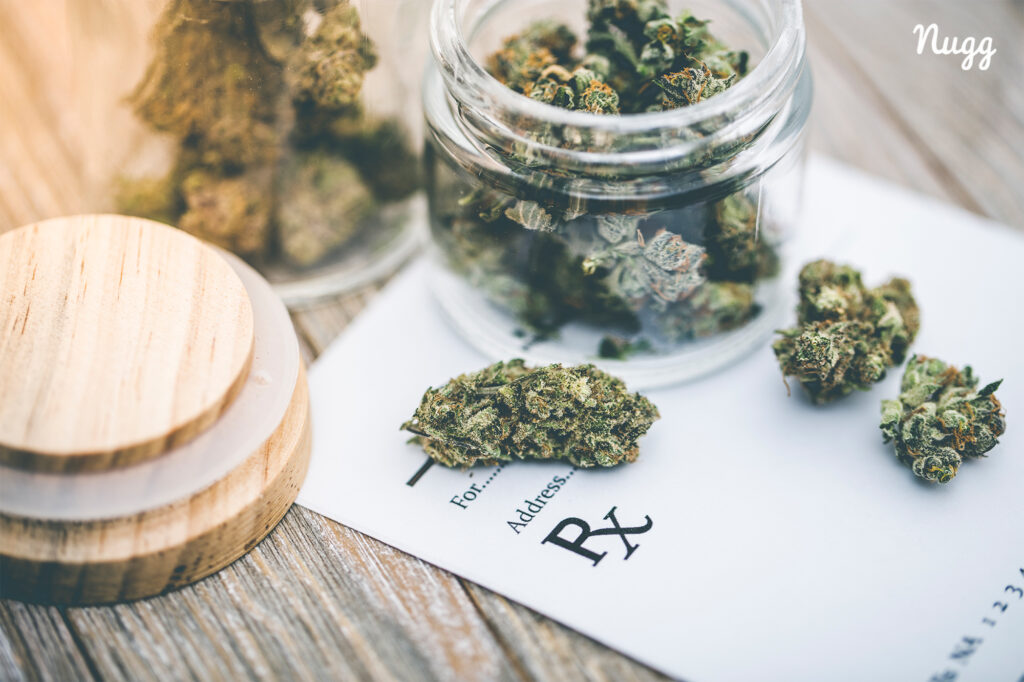
Everyone experiences pain at some point, a natural response to injury or illness. But when pain persists, it’s not only unpleasant but can be disruptive to a person’s daily life. Chronic pain can take various forms, each with different causes.
Common causes of chronic pain, like headaches and lower back pain, aren’t generally considered severe medical conditions, and relief is adequate treatment. That’s especially good news for the estimated 11-25% of adults who suffer from chronic pain.
In some cases, though, chronic pain can be brought on by something more serious. And it’s always best to understand the underlying cause of pain before treating it.
Thankfully, many studies have shown that cannabis can be effective in alleviating chronic pain. It has been suggested that medical cannabis may offer chronic pain patients similar relief with lower risk than opioids.1
What Causes Chronic Pain?
Chronic pain can be caused by a wide range of conditions, like headaches, back pain, and arthritis. An underlying condition, like cancer, fibromyalgia, or a nervous system disorder, can also bring it on. And for some, chronic pain is a lingering effect after a severe injury.
Causes of chronic pain include but are not limited to:
- Headaches
- Back pain
- Neck pain
- Nerve damage
- Cancer
- Fibromyalgia
- Arthritis
- Damage caused by injury
In some cases, the cause of the pain is either unknown or not obvious, making it difficult to diagnose and treat.
Chronic Pain Signs & Symptoms
Chronic pain is usually more of a symptom than a condition itself, and it can present differently depending on the person, the underlying condition, and the form the pain takes.
Chronic pain is not the same as the pain most people are accustomed to when they’re injured. Pain caused by an injury is called acute pain. It’s temporary, and the cause is usually pretty obvious.
Chronic pain is long-lasting. For some people, it’s continuous; for others, it comes in waves. In either case, the pain persists over a long period and usually doesn’t heal on its own.
A broken bone, for example, is not a cause of chronic pain; it’s still acute because the injury will heal. However, if that broken bone causes lasting nerve damage, which causes pain, that pain is chronic.
Chronic pain can feel like stiffness, stinging, throbbing, burning, shooting, or aching. It can occur in varying degrees and persist over a long period (though it doesn’t need to be constant to be classified as chronic). Chronic pain can also feel different under different conditions, such as changes in stress or weight.
Can Cannabis Help Alleviate Symptoms of Chronic Pain?

Chronic pain is one of the most common reasons physicians recommend medical marijuana, and there’s no shortage of evidence suggesting that cannabis can help with chronic pain.
One of the most common reasons cannabis has been studied for pain relief is its potential as a replacement for dangerous and addictive opiates. Multiple studies have concluded that cannabis is effective at treating pain, leading researchers to suggest cannabis as a possible alternative to opiate pain relievers.2 One study even reported an up to 75% drop in opioid usage in patients who used medical cannabis to help treat chronic pain.3
Even though cannabis is widely accepted as an effective option for treating chronic pain, ongoing research into the specifics of cannabis treatment is uncovering trends on how it works and what types of products may work best; one study found that chronic pain patients preferred to inhale cannabis to reduce pain, but edibles, tincture oils, and topicals are all close runner-ups for potential relief.4 Another study noted that the entourage effect may play a role in treating chronic pain, suggesting that dried flower and full-spectrum extracts may be more effective at treating chronic pain than a single compound.5
It should come as no surprise, then, that chronic pain patients view medical cannabis very favorably. One survey of medical cannabis patients treating their chronic pain found that 55% reported “great relief” from their pain, and 45% reported “good relief.”6 Medical cannabis patients are finding that medical cannabis helps treat their pain. The research is building to back it up.
Legality and Doctor’s Recommendation
To determine if your state considers chronic pain to be a qualifying condition for medical marijuana, check out our Laws & Regulations section for the medical cannabis rules for your state.
If you find that your state recognizes chronic pain or its symptoms as a qualifying medical condition, you can seek a doctor’s recommendation to get your medical cannabis card in your state.
How Nugg Can Help

NuggMD is the nation's leading medical marijuana technology platform, serving patients in over half the United States. We’ve connected over 1,300,000 patients with their new medical marijuana doctors face-to-face via our state-of-the-art telemedicine platform.
We believe that every human being has the right to explore the benefits of medical cannabis and are fully committed to helping each patient explore all of their options in their journey to wellness. For further information on whether you qualify for medical cannabis, select your state.
Frequently Asked Questions About Cannabis & Chronic Pain
Do edibles help with chronic pain?
Many patients have reported they were able to find relief with edibles. Though research seems to suggest that inhaled cannabis, whether smoking or vaping, may be more effective.
Which is better for chronic pain: sativa or indica?
A 2014 survey revealed that many patients prefer indica strains for treating chronic pain and getting to sleep. However, this may be due in part to patients already preferring indica strains and smoking more often in the evenings, when indicas are already more popular.
Which strains are best for chronic pain?
Anecdotally, indica strains seem to be best for treating chronic pain. That may be due to their predominantly sedative effects, making them particularly well-suited for helping chronic pain sufferers sleep better. According to consumers, some of the best strains for treating chronic pain are:
- Harlequin
- Cannatonic
- Northern Lights
- Grandaddy Purple
- White Widow
- Blue Dream
- ACDC
- Afghan Kush
- Blackberry Kush
- Reiman A, Welty M, Solomon P. Cannabis as a Substitute for Opioid-Based Pain Medication: Patient Self-Report. Cannabis and Cannabinoid Research. 2017;2(1):160-166. doi:https://doi.org/10.1089/can.2017.0012 ↩︎
- Bobitt J, Kang H, Arora K, Bhagianadh D, Milavetz G, Kaskie B. Offering an Alternative to Persons with Chronic Pain: How Access to Cannabis May Provide an Off-Ramp from Undesired Prescription Opioid Use. Cannabis. 2023;6(2):113-122. Published 2023 Jul 5. doi:10.26828/cannabis/2023/000125 ↩︎
- Okusanya BO, Asaolu IO, Ehiri JE, Jepkoech Kimaru L, Okechukwu A, Rosales C. Medical cannabis for the reduction of opioid dosage in the treatment of non-cancer chronic pain: a systematic review. Systematic reviews. 2020;9(1). doi:https://doi.org/10.1186/s13643-020-01425-3 ↩︎
- Hameed M, Prasad S, Jain E, et al. Medical Cannabis for Chronic Nonmalignant Pain Management. Curr Pain Headache Rep. 2023;27(4):57-63. doi:10.1007/s11916-023-01101-w ↩︎
- Russo EB. The Case for the Entourage Effect and Conventional Breeding of Clinical Cannabis: No “Strain,” No Gain. Frontiers in Plant Science. 2019;9. doi:https://doi.org/10.3389/fpls.2018.01969 ↩︎
- Piper BJ, Beals ML, Abess AT, et al. Chronic pain patients' perspectives of medical cannabis. Pain. 2017;158(7):1373-1379. doi:10.1097/j.pain.0000000000000899 ↩︎
The information in this article and any included images or charts are for educational purposes only. This information is neither a substitute for, nor does it replace, professional legal advice or medical advice, diagnosis, or treatment. If you have any concerns or questions about laws, regulations, or your health, you should always consult with an attorney, physician or other licensed professional.

